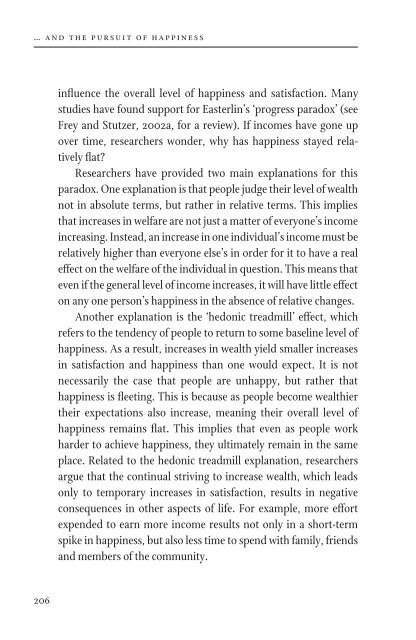… and the Pursuit of Happiness - Institute of Economic Affairs
… and the Pursuit of Happiness - Institute of Economic Affairs
… and the Pursuit of Happiness - Institute of Economic Affairs
You also want an ePaper? Increase the reach of your titles
YUMPU automatically turns print PDFs into web optimized ePapers that Google loves.
<strong>…</strong> <strong>and</strong> <strong>the</strong> pursuit <strong>of</strong> happiness<br />
lessons <strong>the</strong> from unbearable austrian lightness <strong>and</strong> public <strong>of</strong> choice happiness economics policy<br />
influence <strong>the</strong> overall level <strong>of</strong> happiness <strong>and</strong> satisfaction. Many<br />
studies have found support for Easterlin’s ‘progress paradox’ (see<br />
Frey <strong>and</strong> Stutzer, 2002a, for a review). If incomes have gone up<br />
over time, researchers wonder, why has happiness stayed relatively<br />
flat?<br />
Researchers have provided two main explanations for this<br />
paradox. One explanation is that people judge <strong>the</strong>ir level <strong>of</strong> wealth<br />
not in absolute terms, but ra<strong>the</strong>r in relative terms. This implies<br />
that increases in welfare are not just a matter <strong>of</strong> everyone’s income<br />
increasing. Instead, an increase in one individual’s income must be<br />
relatively higher than everyone else’s in order for it to have a real<br />
effect on <strong>the</strong> welfare <strong>of</strong> <strong>the</strong> individual in question. This means that<br />
even if <strong>the</strong> general level <strong>of</strong> income increases, it will have little effect<br />
on any one person’s happiness in <strong>the</strong> absence <strong>of</strong> relative changes.<br />
Ano<strong>the</strong>r explanation is <strong>the</strong> ‘hedonic treadmill’ effect, which<br />
refers to <strong>the</strong> tendency <strong>of</strong> people to return to some baseline level <strong>of</strong><br />
happiness. As a result, increases in wealth yield smaller increases<br />
in satisfaction <strong>and</strong> happiness than one would expect. It is not<br />
necessarily <strong>the</strong> case that people are unhappy, but ra<strong>the</strong>r that<br />
happiness is fleeting. This is because as people become wealthier<br />
<strong>the</strong>ir expectations also increase, meaning <strong>the</strong>ir overall level <strong>of</strong><br />
happiness remains flat. This implies that even as people work<br />
harder to achieve happiness, <strong>the</strong>y ultimately remain in <strong>the</strong> same<br />
place. Related to <strong>the</strong> hedonic treadmill explanation, researchers<br />
argue that <strong>the</strong> continual striving to increase wealth, which leads<br />
only to temporary increases in satisfaction, results in negative<br />
consequences in o<strong>the</strong>r aspects <strong>of</strong> life. For example, more effort<br />
expended to earn more income results not only in a short-term<br />
spike in happiness, but also less time to spend with family, friends<br />
<strong>and</strong> members <strong>of</strong> <strong>the</strong> community.<br />
A strong set <strong>of</strong> policy conclusions has emerged from <strong>the</strong>se<br />
explanations for <strong>the</strong> progress paradox. For example, numerous<br />
happiness researchers call for some form <strong>of</strong> taxation on labour<br />
<strong>and</strong> luxury goods (see Frank, 1999; Layard, 2005). The logic<br />
behind this tax is as follows. If relative wealth is what matters,<br />
<strong>the</strong>n an increase in one person’s wealth, relative to o<strong>the</strong>rs, must<br />
harm o<strong>the</strong>r people. This is <strong>the</strong> equivalent <strong>of</strong> a negative externality,<br />
which is typically solved through a tax that forces people to internalise<br />
<strong>the</strong> cost <strong>of</strong> <strong>the</strong>ir actions. In <strong>the</strong>ory, a tax would raise <strong>the</strong> cost<br />
<strong>of</strong> consuming labour or luxury goods, overcoming <strong>the</strong> causes <strong>of</strong><br />
<strong>the</strong> progress paradox discussed above. That is not all. Proponents<br />
<strong>of</strong> this type <strong>of</strong> taxation add that <strong>the</strong>re is ano<strong>the</strong>r benefit because<br />
<strong>the</strong> money raised through taxes can be used for such ‘public<br />
goods’ as better schooling, recycling, more art programmes,<br />
healthcare <strong>and</strong> public transportation, among o<strong>the</strong>rs (see Frank,<br />
1999: 249–61; Griffith, 2004: 1392; Layard, 2005: 47). At first<br />
blush, <strong>the</strong>se policy prescriptions seem like a win-win, for proponents<br />
promise not only more happiness, but more public goods<br />
as well.<br />
We, however, are sceptical. The purpose <strong>of</strong> this chapter is<br />
to raise some conceptual <strong>and</strong> practical issues with <strong>the</strong> study <strong>of</strong><br />
happiness economics <strong>and</strong> <strong>the</strong> associated policy recommendations<br />
as outlined above. Our analysis draws on concepts from Austrian<br />
economics <strong>and</strong> public choice economics.<br />
Among o<strong>the</strong>r things, Austrian economics emphasises <strong>the</strong><br />
subjectivity <strong>of</strong> costs <strong>and</strong> benefits; <strong>the</strong> importance <strong>of</strong> dispersed<br />
<strong>and</strong> context-specific knowledge <strong>of</strong> time <strong>and</strong> place, which is crucial<br />
to economic coordination <strong>and</strong> cannot be known or collected by<br />
planners; <strong>and</strong> that <strong>the</strong> market is a continuous process characterised<br />
by productive entrepreneurial activities. Public choice<br />
206 207












